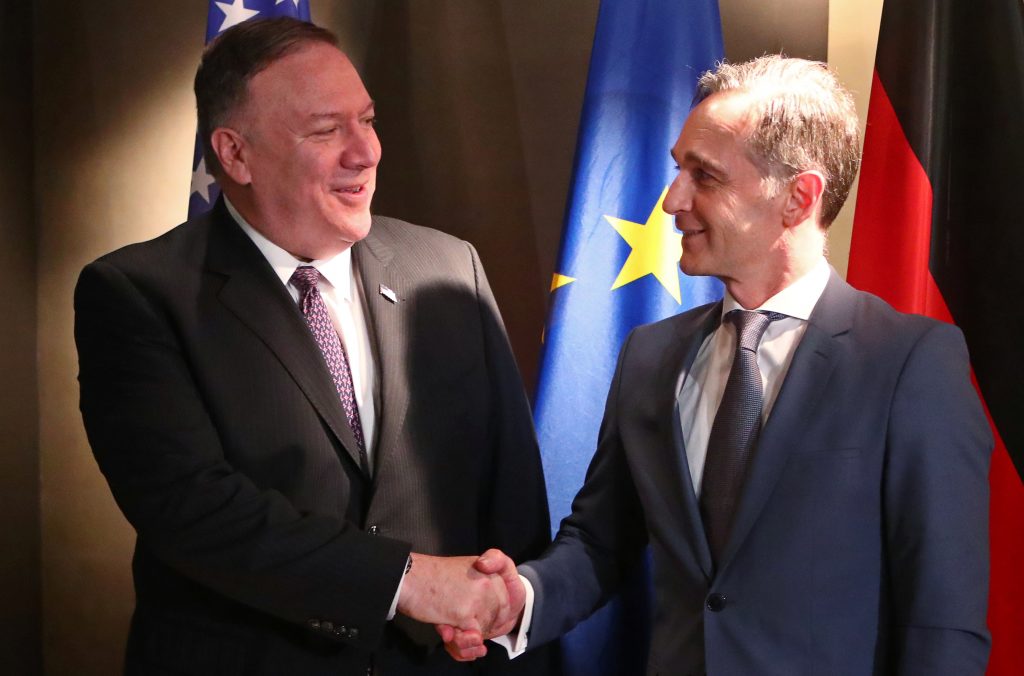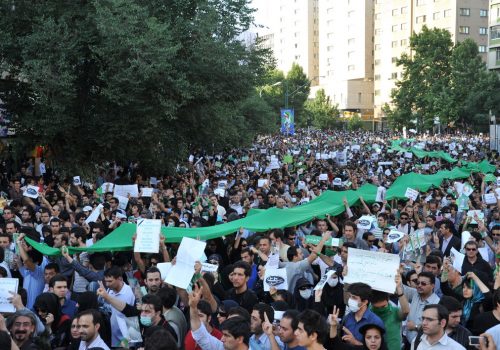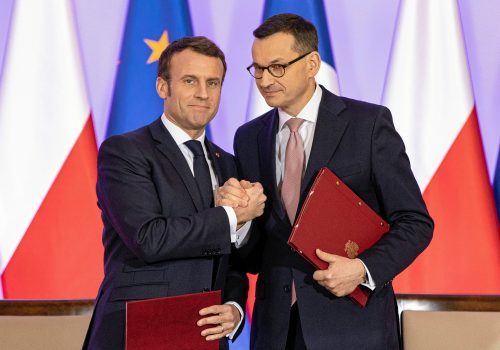Munich— Is it time to start worrying about Germany again?
This past weekend’s Munich Security Conference (MSC) – the most significant gathering of its kind – focused on great power competition, China’s relentless rise and the West’s assumed division and decline (captured by the MSC’s provocative theme of “Westlessness”).
What was most missing, in this Bavarian city dripping with history, was an urgently required focus on the quadruple shock challenging Germany’s role as Europe’s pillar of stability and irreplaceable leader.
Those four challenges – listed here in no order of importance – are Brexit’s hit to the European balance, President Trump’s transatlantic test, Germany’s political fragmentation, and its slowing, endangered economy.
Get the Inflection Points newsletter
Subscribe to Frederick Kempe’s weekly Inflection Points column, which focuses on the global challenges facing the United States and how to best address them.
Each of those four forces tears at the fabric of the political and economic certainties that have defined post-Cold War Europe and Germany, coming in the thirtieth anniversary year of the country’s reunification.
They also raise what has been known historically as “the German Question” for a new era. In short, the German Question pertains to the problem of a Germany that has either been too weak (17th and 18th centuries) or too strong (late 19th and first half of 20th century), to live easily beside other European powers.
With the country’s unification in 1871, a nation was born at Europe’s heart that ultimately became too powerful to be balanced by its neighbors. Only after two world wars and the rise of European and transatlantic institutions, was this dilemma settled for a time.
Following its 1990 reunification, today’s Germany remains too weak to effectively lead Europe (militarily and geopolitically) and too strong (economically) to be an equal partner with the other 27 EU member. It has grown too inwardly focused to shoulder European responsibility in the face of great power competition among the U.S., Russia, and China.
A brief look at the quadruple shocks Germany confronts is a useful prism to study the problem. It also makes clear how high the stakes are for its partners, European and American, in the German future.
Brexit and Germany
“Without the UK, Germany is pushed into an EU role it hates,” writes Andreas Kluth in Bloomberg. “It loses a liberal soulmate, a counterweight to France, above all a counterweight to itself.”
Little attention has been given to one of the most significant questions of Brexit, and that is how it could influence Germany and upset the European balance. The United Kingdom’s departure makes Germany stronger and weaker simultaneously.
It is much stronger economically, and thus it will be more tempted to exert its leverage, as its share of total European Union GDP will grow to 25% from 21%. It will be weaker in that the political weight of the continent will move south and east to countries that are more “dirigiste” in their belief in state intervention. On these issues, the UK was Germany’s crucial ally.
Trump and Germany
The most disturbing moment of MSC for me, an American son of German immigrants, was the indirect rhetorical conflict between German President Frank-Walter Steinmeier and U.S. Secretary of State Mike Pompeo.
Without mentioning names, President Steinmeier used his largely ceremonial position to take a swipe at President Trump for disregarding alliances, which was answered a little later by Secretary Pompeo’s riposte that such thinking “doesn’t reflect reality.”
Lost in Munich was sufficient recognition that the two countries were bound both by history and the future. Three U.S. cabinet secretaries and 41 members of Congress were in Munich over the weekend, yet even that couldn’t reignite the flame of common cause.
“The democratic and peace-loving Germany everyone knows and loves today grew up in the particular circumstances of the U.S.-dominated international liberal order established after World War II,” writes the historian Robert Kagan in Foreign Affairs.
Four elements had been crucial to that outcome, all of which are now in some degree of doubt.
They included unquestioned U.S. commitment to European security; the emergence of a European and international economic system of free trade; a Europe where democracies were ascendant and nationalism was in check; and the establishment of European and transatlantic institutions that integrated Germany and provided a collective identity.
German political fragmentation
The erosion of the German political middle has always been perilous, dating back to the Weimar Republic in 1918-1933.
With both the country’s leading political parties eroding, the Christian Democrats and the Social Democrats, Germany’s political landscape is in growing question.
This week provided a reminder that Chancellor Angela Merkel’s record four terms and 14 years is nearing a close without any clear idea of what follows. Her hand-picked successor, Annegret Kramp-Karrenbauer (known as AKK), announced on Monday she would step aside following a scandal in the federal state of Thuringia that involved her local party officials turning to the far-right Alternative for Germany party to elect a state premier.
What’s likely to follow are many months of German political uncertainty and inward-looking at a time when this year’s U.S. elections, Russia’s continued regional meddling, and a forthcoming EU-Chinese summit in Leipzig this September all require Berlin’s leadership.
European populism and nationalism have been more muted in Germany than elsewhere, but the increased weakness of the center could further feed the fringe.
The German economy
German worries are growing about a 2020 recession, driven both by trade tensions and the backlash from coronavirus. Economic results for last year’s fourth quarter came in at zero growth this week, and the first quarter of this year is likely to be worse.
Longer term, German analysts worry that German industry isn’t adopting new technologies quickly enough – from electric and autonomous cars to artificial intelligence and 5G telecommunications – to sustain their export-driven, manufacturing industries.
It’s easy to understand why Germans defend the status quo, which has served them well over the past few decades. What’s unclear is how Germany will react with so many certainties shaken: the shape of the EU, relations with the U.S., the stability of German politics, and the durability of economic growth.
With all the world’s focus on a rising China and an aggressive Russia, it would be a mistake to underestimate the significance of Germany’s crucial role at the heart of an uncertain Europe.
This article originally appeared on CNBC.com
Frederick Kempe is president and chief executive officer of the Atlantic Council. You can follow him on Twitter @FredKempe.
Must-reads from a world in transition
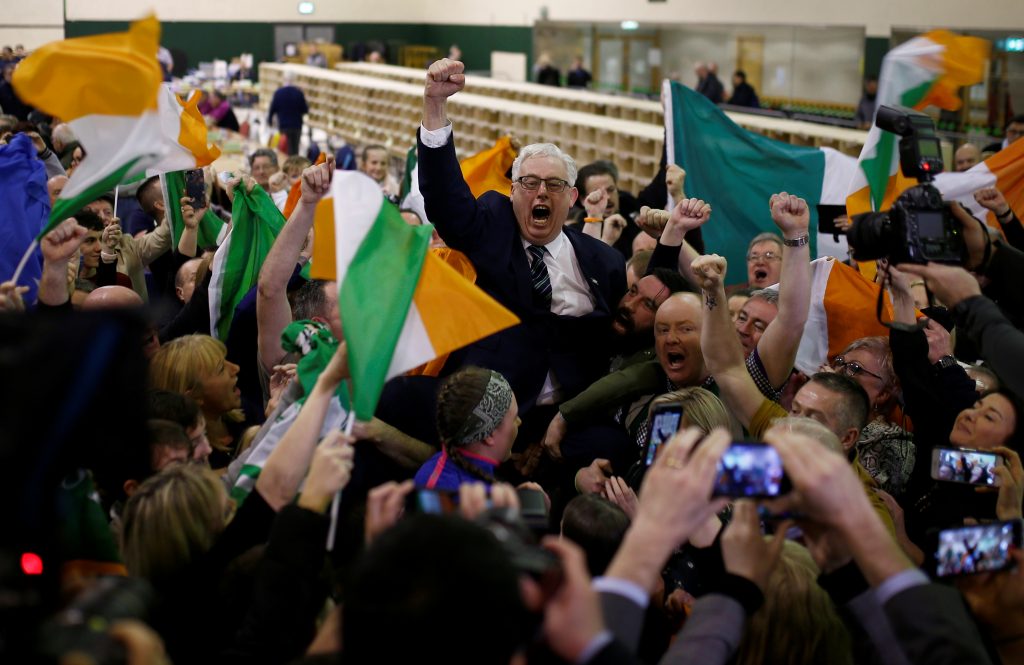
This week’s must-reads capture some of the drama of Munich, both in divisions between the United States and its biggest EU allies, and concerning difference over China. Also read Der Spiegel’s look at the existential importance of the CDU’s urgent look for a new leader to replace Angela Merkel.
Don’t miss The Economist’s thought-provoking report on this week’s political earthquake, Sinn Fein’s stunning performance in Irish elections, and what it says about the prospect of Irish unification with Northern Ireland (which has recently become majority Catholic).
I’m not sure I agree with this week’s must read from Graham Allison in Foreign Affairs, but his argument is thought-provoking for why our dramatically shifting global landscape should prompt the United States to do a zero-based analysis of its alliances.
#1. A U.S.-EUROPEAN DISCONNECT?
Trump camp finds no appeasement in Europe
Matthew Karnitschnig / POLITICO
Europe’s geopolitical year ended before it began
Matthew Karnitschnig / POLITICO
If the Munich Security Conference illustrated anything, writes Matt Karnitschnig of Politico, “it was that the divergence between the U.S. and the dominant European powers – German and France – is greater than ever.” Read More →
Yet don’t read that Munich curtain-closer from Karnitschnig in isolation from his excellent Munich curtain-raiser, which tracks Europe’s geopolitical weakness. What I found in Munich was that the Nordics and Central Europeans are heartened by US defense commitments – and are in no hurry to pass their fate to a European defense structure.
“Increasingly squeezed between the U.S., China and Russia,” writes Karnitschnig, “the Continent has become paralyzed, unable to offer a coherent geopolitical strategy or even speak with one voice…Europe finds itself not just sandwiched between competing foreign interests but also hostage to its internal divisions.” Read More →
The twelve Central European members of the EU were particularly heartened by Secretary Pompeo’s announcement that the U.S. would offer up to $1 billion in credits for their Three Seas Initiative, which is aimed at building energy, transportation and telecommunication infrastructure. Read More about it from the Atlantic Council.
#2. THE CHINA CHALLENGE
The U.S. Seeks to Rally Wary Europeans Against China
Courtney McBride, Nancy Yossef and Lawrence Norman / The Wall Street Journal
Europe Needs a China Strategy; Brussels Needs to Shape It
Julianne Smith, Torrey Taussig/ LAWFARE
One thing was clear in Munich: China would be the issue that divides or unites going into the future, both regarding the transatlantic community and Europe itself.
Three Wall Street Journal reporters provide a good account of how the Europe conversation unfolded in Munich. Even more useful was the report by Julianne Smith and Torrey Taussig in Lawfare on how Europe is catching up with American worries on China. Yet although the EU fingered Beijing as a “systemic rival” last March, it has done little since about the problem.
EU officials in Brussels “have many of the ingredients for a stronger and more coherent strategy on China,” they argue, but it’s unclear they will have national partners to implement any workable plan.
#3. A VOTE FOR IRISH UNITY?
A united Ireland: Irish unification is becoming likelier
THE ECONOMIST
Even in the rush of other global events, don’t miss the past week’s Irish electoral earthquake. The Economist reports on how the duopoly that has ruled Ireland since its independence was “smashed apart” by the victory of the Sinn Fein party, known best previously for its links with the Irish Republican Army.
“Scottish independence has grabbed headlines since Brexit,” writes The Economist, “but it is time to recognise the chances of a different secession from the United Kingdom. Sinn Fein’s success at the election is just the latest reason to think that a united Ireland within a decade or so is a real—and growing—possibility.” Read More →
#4. THE GERMAN QUESTION
Germany’s Conservatives Face a Fight for Their Future
DER SPIEGEL
Der Spiegel delivers a valuable look at why the German CDU’s look for a new leader is about much more than that.
“The party must now rapidly find answers to the difficult questions it has ignored during its last decade-and-a-half in government,” writes Germany’s leading newsmagazine. “What does the party want to stand for? What answers does it have for the environmental, economic and technological upheavals facing Germany in the coming years? Will it remain true to the centrist course charted by Merkel or will it succumb to the pressure from the AfD and steer to the right, potentially even veering to the far right, as other conservative parties in Europe have done? Read More →
#5. “ALLIANCES ARE NOT FOREVER”
The New Spheres of Influence
Graham Allison / FOREIGN AFFAIRS
Read every word of Graham Allison’s provocative, must-read look in Foreign Affairs at the need to rethink alliances and spheres of influence, whether or not you agree with his findings.
What’s undeniable is his point that something’s got to give after a “tectonic shift” in the balance of power over the past twenty years, that is as big as anything the country has witnessed during any similar period of time in its history.
“Washington should focus above all on its alliances and partnerships,” he writes. “The U.S. alliance system should be subjected to a zero-based analysis: every current ally and partner, from Pakistan, the Philippines, and Thailand to Latvia, Saudi Arabia, and Turkey, should be considered in terms of what it is doing to enhance U.S. security and well-being, and with what risks and costs. Alliances are not forever.” Read More →
Quote of the week
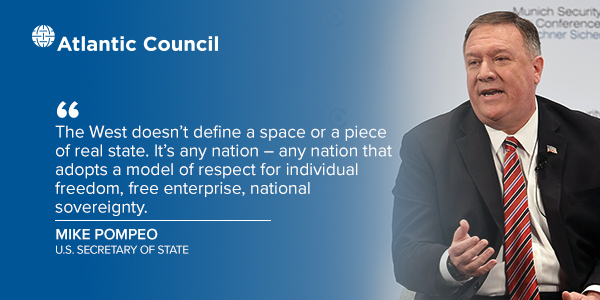
Atlantic Council Top Reads
Image: U.S. Secretary of State Mike Pompeo and German Foreign Minister Heiko Maas shake hands at a bilateral meeting during the annual Munich Security Conference in Munich, Germany February 14, 2020. REUTERS/Michael Dalder/Pool
